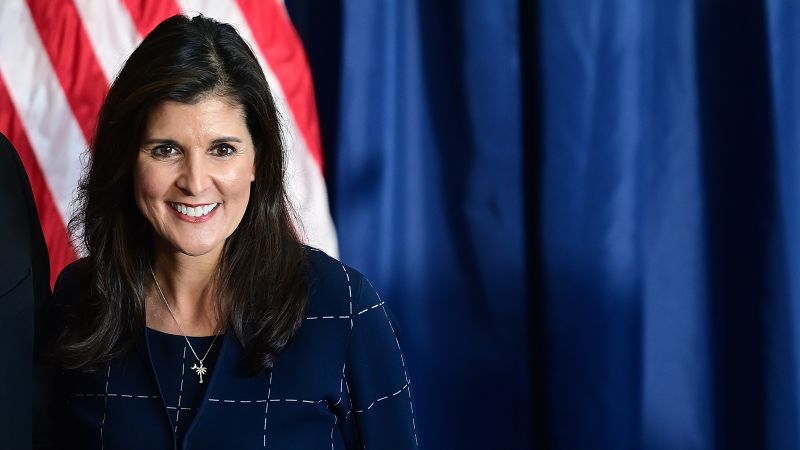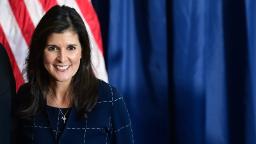

A version of this story appears in CNN’s What Matters newsletter. To get it in your inbox, sign up for free here.
CNN
—
Former President Donald Trump’s attempt to clear the field has officially failed.
Nikki Haley – a former member of his Cabinet who had served as US Ambassador to the United Nations and was previously governor of South Carolina – officially announced she’s running for the GOP presidential nomination with a video on Tuesday and a speech planned in her home state on Wednesday.
In her announcement video, Haley emphasized her background as the child of immigrants from India who found success in South Carolina. She promised to stand up for what she sees as American values, but did not use some of the abrasive language about “wokeness” employed by people like Florida Gov. Ron DeSantis, another likely presidential candidate.
Haley called for a generational shift in the GOP and argued the party must reach across the aisle since Democrats have won the popular vote in seven of the last eight presidential elections.
“It’s a call for the new way of thinking and presenting the Republican Party,” CNN political director David Chalian said Tuesday.
“Her goal here is to carve out a space that is clearly not the space that Donald Trump and Ron DeSantis are currently occupying, which is really playing only to the base.”
Haley is not the only Republican candidate expected to challenge Trump. She’s not even the only big-name Republican from South Carolina expected to challenge Trump. Sen. Tim Scott is also seriously considering a run.
She’s also not the only former Trump administration official who could challenge their old boss. Former Vice President Mike Pence has been courting social conservatives. Former Secretary of State Mike Pompeo recently released a memoir and is attacking President Joe Biden’s foreign policy in interviews this week.
Haley, Pompeo, Pence and Scott will face an uphill climb since none of them are currently particularly strong in surveys of Republican primary voters – which suggest the majority of those voters currently either support Trump or DeSantis.
CNN’s Harry Enten recently wrote about how while top candidates can frequently flame out and there is precedent for a candidate with little name recognition to win the primary (and the White House!), those are the exceptions.
“While Trump or DeSantis are the odds-on favorites for the nomination, there is enough history of low-polling candidates later gaining traction to at least be open to the idea that a Haley, Pence or somebody else could, if nothing else, make things interesting come voting time,” Enten wrote this month.
I asked CNN’s polling editor Ariel Edwards-Levy if these candidates who jump into a presidential race at single digits in polls have any real chance of winning. She looked at pre- and post-announcement polling for each of the major party candidates since George H.W. Bush announced his candidacy in October 1987.
What she found is not good news for relative unknowns. Most winning candidates have a solid double-digit base of support among primary voters when they officially become candidates:
- Biden’s support was nearly 40% when he announced his primary run in April 2019 in a crowded field.
- Hillary Clinton’s support was at 60% or more in April 2015 in a much less crowded field.
- Trump had been in the single digits before his announcement in June 2015, but got an immediate bump after his controversial announcement speech and was soon hovering at around 20%.
- Mitt Romney emerged from an extremely crowded field after his announcement in June 2011, but he never fell far below 20% support among primary voters.
- Barack Obama announced in February 2007 to more than 20% support, somewhat more than John McCain had in April 2007, when both men faced crowded primaries. McCain turned his campaign around from the brink later in the race.
- So did John Kerry, who entered the race with less than 20% support in September 2003 and caught fire after the Iowa caucuses in January 2004.
- Al Gore had strong support when he announced in June 1999 – over 60% in most polls – but he faced a much smaller field. George W. Bush was similarly strong then, but in a larger field of Republican candidates.
- The only relatively recent example of a low-polling candidate emerging with the party’s nomination is Bill Clinton, who styled himself as the “Comeback Kid.” And that 1992 election was a special race for a number of reasons, not the least of which is Clinton ultimately won the White House in a three-way race with only a little more than 40% of the popular vote.
“It’s hard to know precisely how much predictive value to assign to these historical precedents,” Edwards-Levy told me. “Obviously, it’s better for a candidate to start with a broad base of support than without any backing, but every election carries its own degree of idiosyncrasy. If the past few election cycles have taught us anything, it’s to be modest about assuming which past principles will hold – or break.”
CNN’s Eric Bradner has published a list of potential Republican presidential candidates and what they’ve said about whether they’ll run. The quotes from these potential candidates range from very interested and not hiding it, to clearly interested but still being cagey, to not admitting any interest at all.
Read Bradner’s report, but I’ve done something a little different, which is to take his list of potential candidates and note their most recent memoir (most of them have one) and what it could say about their potential campaign. I’ve left off Trump here, since his “The Art of the Deal” is now decades old.
The Florida governor’s memoir – “The Courage to Be Free: Florida’s Blueprint for America’s Revival” – is set to be released in late February.
DeSantis frequently talks about how he’s standing up for freedom, often by placing restrictions on school districts and local governments. He’s not afraid of being divisive, and he wants you to know it.
The former UN ambassador’s memoir – “With All Due Respect: Defending America with Grit and Grace”– suggests Haley sees no reason to be as combative as DeSantis even if she wants to appear just as committed.
While she has at times sought distance from Trump, in her memoir, she wrote about rebuffing an effort by Trump’s aides to recruit her to undermine him.
The former vice president’s memoir – “So Help Me God” – details Pence’s fractures with Trump.
The title flicks at the optional coda public servants may add to the oath of office. Pence is both invoking the importance of God to him and his politics – he is a committed evangelical – and pointing out he kept his oath when he refused to turn the 2020 election for Trump.
In the former secretary of state’s memoir – “Never Give an Inch: Fighting for the America I Love” – Pompeo alleges that Haley plotted with Ivanka Trump and Jared Kushner to try to become vice president. And the title suggests a candidate who will be dismissive of anyone who questions him.
Scott is the only Black Republican in the Senate, and his memoir has an inspiring story. He shorthands his family’s journey as going from “cotton to Congress.” He tells it in the memoir – “America, a Redemption Story: Choosing Hope, Creating Unity” – which also has a theme of second chances.
While Noem has said she’s not sure she needs to run for president, she did write a memoir: “Not My First Rodeo: Lessons from the Heartland.”
Cruz checked the memoir box before he ran unsuccessfully for president in 2016 with, “A Time for Truth: Reigniting the Promise of America.”
Cruz has written two books since then, including a political salvo against liberals and the law: “Justice Corrupted: How the Left Weaponized Our Legal System.”
It’s not at all clear that Abbott will run, but he wrote a memoir in 2016 before his second run for governor: “Broken But Unbowed: The Fight to Fix a Broken America.”
Hogan’s seriously considering a campaign, and his memoir suggests a middle path – which could be compelling in a general election, but might be more difficult as a way to convince Republican primary voters. Its title: “Still Standing: Surviving Cancer, Riots, a Global Pandemic, and the Toxic Politics that Divide America.”
Christie lost to Trump in the 2016 primary and was then pushed out of Trump’s administration before it began.
His memoir from the Trump years, “Let Me Finish: Trump, the Kushners, Bannon, New Jersey, and the Power of In-Your-Face Politics,” torches Kushner.
His more forward-looking recent book is, “Republican Rescue: Saving the Party from Truth Deniers, Conspiracy Theorists, and the Dangerous Policies of Joe Biden.”
Others who are viewed as potential candidates, like New Hampshire Gov. Chris Sununu, Virginia Gov. Glenn Youngkin and former Arkansas Gov. Asa Hutchinson, do not appear to have memoirs at this point – which may or may not say something about whether they will ultimately run.
